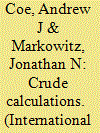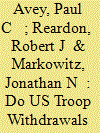|
|
|
Sort Order |
|
|
|
Items / Page
|
|
|
|
|
|
|
| Srl | Item |
| 1 |
ID:
181669


|
|
|
|
|
| Summary/Abstract |
For many centuries, conquest was commonplace, and its attractiveness was central to the character of international politics. Why has it declined? Existing theories cannot explain why powerful countries no longer conquer states with easily extractable wealth. We develop an explanation based on the relationship between a potential conqueror's economic productivity and its ability to profit from conquest. Productivity has opposing effects on conquest's profitability: it raises the opportunity cost of each asset diverted to conquest, but also reduces the quantity of assets required for conquest. The net effect is determined by the composition of investment in innovation. We document that since at least 1950 investment has been predominantly aimed at civilian, not military innovations, so that rising productivity should reduce conquest's net profitability. Using cost analyses of comparable wars, we estimate bounds on the profitability of conquering the oil and gas reserves of the Persian Gulf, a very tempting target, for the United States and Iraq, two potential conquerors of widely differing productivity. Though both mechanisms operate, we find that the net effect of higher productivity is to reduce the profits from conquest. Moreover, this net effect is large enough to render conquest generally unprofitable for contemporary high-productivity states.
|
|
|
|
|
|
|
|
|
|
|
|
|
|
|
|
| 2 |
ID:
157852


|
|
|
|
|
| Summary/Abstract |
Does withdrawing forward-deployed US troops increase instability? This question is at the heart of current grand strategy debates, yet endogeneity issues make this very difficult to answer. Put simply, stability may cause the United States to withdraw forces and lead one to incorrectly infer that withdrawals do not lead to greater instability. We suggest a research design to help alleviate this endogeneity problem. By utilizing exogenous crises that cause US troops to redeploy out of South Korea, we are able to estimate the causal effect of a withdrawal of US troops on the probability of instability. We examine several exogenous crises after the end of the Korean War that force US policymakers to rapidly redeploy US forces out of South Korea. We then examine the rate of conflict between South Korea and North Korea, and the United States and North Korea. We find that US troop withdrawals do not cause greater conflict, but withdrawals are at times associated with other behaviors, such as conventional arming, nuclear proliferation, and diplomatic initiatives that could affect the future likelihood of war.
|
|
|
|
|
|
|
|
|
|
|
|
|
|
|
|
| 3 |
ID:
157585


|
|
|
|
|
| Summary/Abstract |
Why do only some powerful states choose to develop power projection capabilities? To answer this question, we test the proposition that states choose to develop power projection capabilities when they face a competitive geopolitical environment. This proposition is derived from our theory, which is used to construct a new measure of the level of geopolitical competition that every state in the system faces. This measure incorporates each state’s relative geographic position to every other state in the international system, the relative amount of economic power of those other states, and the degree to which their interests are compatible. We then apply this unique country-year measure to test the proposition that competitive environments are associated with the development of power projection capabilities, as measured by the tonnage of naval ships maintained by each country in each year. We demonstrate that our measure helps explain the degree to which states choose to invest in power projection capabilities. This provides an explanation for why the world has been economically multipolar, but military unipolar, for the past quarter century, and why this might change in the future, as rising powers with incompatible interests are increasing their investment in power projection capabilities.
|
|
|
|
|
|
|
|
|
|
|
|
|
|
|
|
|
|
|
|
|